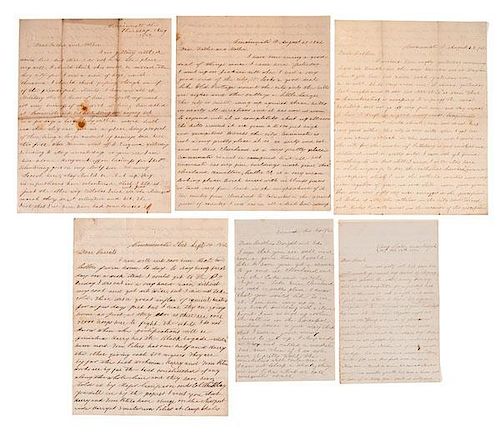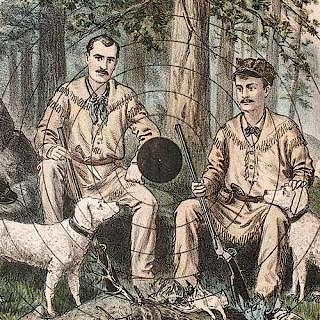Civil War Engineer, Robert S. Paul, Manuscript Archive
About Seller
6270 Este Ave.
Cincinnati , OH 45232
United States
With offices in Cincinnati, Cleveland and Denver, Cowan’s holds over 40 auctions each year, with annual sales exceeding $16M. We reach buyers around the globe, and take pride in our reputation for integrity, customer service and great results. A full-service house, Cowan’s Auctions specializes in Am...Read more
Two ways to bid:
- Leave a max absentee bid and the platform will bid on your behalf up to your maximum bid during the live auction.
- Bid live during the auction and your bids will be submitted real-time to the auctioneer.
Bid Increments
| Price | Bid Increment |
|---|---|
| $0 | $25 |
| $500 | $50 |
| $1,000 | $100 |
| $2,000 | $250 |
| $5,000 | $500 |
| $10,000 | $1,000 |
| $20,000 | $2,500 |
| $50,000 | $5,000 |
| $100,000 | $10,000 |
About Auction
Nov 20, 2015 - Nov 21, 2015
Cowan's Auctions dawnie@cowans.com
- Lot Description
Civil War Engineer, Robert S. Paul, Manuscript Archive
50 Letters, 1860-1907, (bulk 1862-1866).
Robert S. Paul (1843-1905) was a member of the Army Corps of Engineers during the Civil War, based out of Cincinnati, Ohio. He was the third son of Hosea Paul and Ellen Gamble from Cuyahoga, Ohio. Hosea Sr., Hosea Jr. and Robert all worked as surveyors and engineers, and at age 19 Robert joined the Civil War.
Robert S. Paul worked in the Civil War as a part of the Army Corps of Engineers supply companies in Cincinnati. According to the application of his widow in 1907 for a new discharge certificate, he was in charge of the quartermasters and commissary stores and also in the engineering department or corps. The collection contains letters with direct orders from James Hervey Simpson, with instructions regarding supplies. Robert’s brother Harrison was the leader of multiple companies and was responsible for building fortifications around Cincinnati. Some of the most interesting parts of the collection describe Robert’s experiences in Cincinnati. He has a very strong point of view, and describes his disappointment with seeing the city where he was stationed.
In August 1862 he arrived in Cincinnati, and wrote to his parents of the problems the city had with enlistment, as there was a large and vocal secessionist community. He also said, This city is very dirty, when I got here it was about 6 o’clock in the morning and I could see the city for the smoke if Pittsburg is any smokier and dirtier it must be pretty dirty. On August 25 he wrote, Cincinnati is not a very pretty place it is so dirty and hot and no trees. Cleveland is a very pretty place Cincinnati cannot be compared to at all, but Cincinnati has very fine buildings…Brick houses with no blind fences or trees. That month he also wrote, I am getting settled down here but still I do not like the place very well. I should think this would be called the hog city for I saw a drove of hogs, several thousand I should think passing through one of the principal streets. On September 14, Robert noted that there was a great influx of squirrel hunters for a few days past but I hear they are going home as fast as they can as there are over 75,000 troops here to fight the whole. The “squirrel hunters” were local militia volunteers who were instructed to defend Cincinnati from September 1-13, 1862 when it was threatened by Confederate forces. After this attack, the fortifications around Cincinnati were increased significantly, and Robert participated in that process.
Many of his letters describe the work his brother Harrison was doing with the assistance of the brigades that he commanded. On October 17, 1862 from Camp Shaler, Robert described the arrival of General George Washington Morgan into camp, after his retreat from the forces of Col. John H. Morgan, A day or two ago one brigade of Gen. Morgan’s army from Cumberland Gap came into Covington. They were rigged out in all the pomp and pride of glorious war over the left any one seeing them could exclaim “Who would not be a soldier boy.” Well I never in all my life saw a more ragged, gaunt, famine stricken set of men in all my life. Let me describe the company of them. In the first rank the first man has on a straw hat without a brim his hair and whiskers one of six months growth he has a linen coat+ a pair of Kentucky jean pants so dirty and torn that you could not tell what color they originally were… Robert Paul’s colorful language shows an extremely cynical view of the war effort, but provides wonderful understanding of the Ohio Valley during this period.
This archive as well as others from the Paul family also features several examples of Civil War-dated letters between Robert and his father and brothers containing encrypted messages, presumably connected to the family's wartime activities. While the letters are signed in the writer's hand, the content is indecipherable.
After returning from the war, Robert got married in 1873 and fathered five children. He died in 1905 in Akron, OH. After the war, one of his major interests was working with the Cuyahoga Falls Literary Club, and most of the post-Civil War letters are related to membership in the club. - Shipping Info
-
SHIPPING. At the request of the buyer, Cowan's will authorize the shipment of purchased items. Shipments usually occur within two weeks after payment has been received. Shipment is generally made via UPS Ground service. Unless buyer gives special instructions, the shipping method shall be at the sole discretion of Cowan's Auctions, Inc.. Cowan's is in no way responsible for the acts or omissions of independent handlers, packers or shippers of purchased items or for any loss, damage or delay from the packing or shipping of any property.
-
- Buyer's Premium



 EUR
EUR CAD
CAD AUD
AUD GBP
GBP MXN
MXN HKD
HKD CNY
CNY MYR
MYR SEK
SEK SGD
SGD CHF
CHF THB
THB













